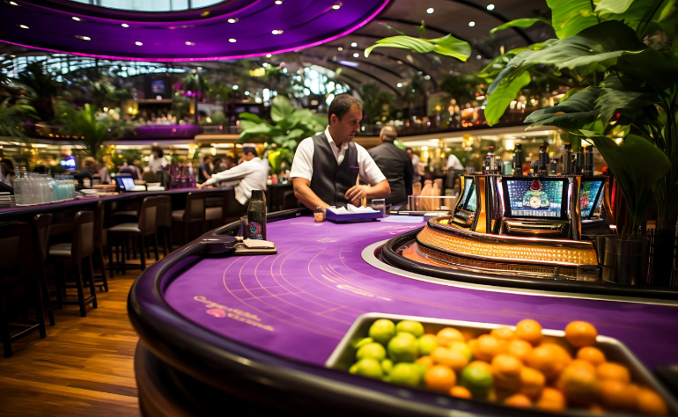Casino slots machines have enthralled players for decades, drawing them into a world of flashing lights, enticing sounds, and the excitement of chance. These devices, commonly found in colorful casinos, combine aspects of luck and strategy, making them an exciting option for beginners and seasoned gamblers alike. But what is it that makes these games so appealing? The answer lies in the complex psychology at play as individuals engage with these vivid reels.
Whether it’s the wave of excitement while waiting for the outcome of a spin or the thrilling feeling of a big win, the emotional response provoked by casino slots is considerable. The design of these machines is meticulously designed to activate the brain’s reward system, creating an event that can be both exciting and compulsive. Understanding the psychological factors at play in engaging with casino slots machines can provide insight into the reasons so many people are attracted to them and how they affect behavior and choices in the gambling environment.
Understanding the Allure of Slot Machines
Slot machines have a distinct ability to enthrall players with their lively graphics and tempting sounds. The dazzling lights and enthralling themes create an welcoming atmosphere that draws people in. Each rotation of the reels promises the chance of a significant win, igniting a sense of thrill and expectation that keeps players revisiting for more. This sensuous experience plays a crucial role in the charm to casino slots games, as it arouses not only the mind but also the senses.
A major factor contributing to the allure of slot machines is the notion of instant gratification. Unlike other casino games that require skill or strategy, slots offer immediate results with each spin. The fast pace of the game allows for swift engagement, enabling players to experience the rush of winning or the letdown of losing in a matter of seconds. This rapid feedback loop can lead to a highly compulsive experience, as players chase the next likely payout while being mesmerized by the game’s perpetual opportunity for excitement.
Moreover, the psychology of jackpot possibility cannot be overlooked. The allure of hitting a fortune-altering payout keeps players revisiting, frequently surpassing the odds against winning. Many players find themselves fantasizing about the potential of striking it rich, fueled by stories of others who have won big. This sense of optimism, along with the excitement of the game, creates an unavoidable lure that characterizes the world of casino slots and makes them a popular among players.
The Role of Reinforcement in Gambling
The role of reinforcement plays a significant role in the psychology of interacting with casino slots games. When players interact with these machines, they encounter various forms of reinforcement that can affect their behavior. BL555 Positive rewards is particularly effective; obtaining a win, or even the possibility of winning, can create a thrill that keeps players coming back for more. The immediate feedback from the reels spinning, coupled with audio cues and visual stimuli, further enhances this pleasurable experience, reinforcing the desire to continue playing.
The randomness of winning in casino slots games also ties into the concept of variable reinforcement. This psychological phenomenon occurs when payouts are given out at random intervals, making the expectation of a potential win more thrilling. Players may go for long periods without significant wins but are drawn back by recollections of past jackpots or the possibility of future ones. This uncertainty heightens excitement and keeps players waiting for that next big payout, entrenching them deeper into the betting cycle.
Finally, the communal element of playing casino slots games can amplify reinforcement. Many players enjoy the shared environment of a casino, where they might see others winning, celebrate wins, or even commiserate over losses. This social reinforcement can create a collective experience that encourages repeated play. Players might feel motivated to continue not only for personal gain but also to experience the fellowship that comes with playing, reinforcing their overall attachment to the game.

The Impact of Game Design on Player Behavior
Design of slot machines plays a crucial role in shaping player behavior and enhancing the gaming experience. Elements such as graphics, audio, and themes are intentionally crafted to attract players and keep them engaged. Vivid hues and inviting animations create a aesthetically stimulating environment that can lead to extended play sessions. Additionally, concepts ranging from ancient civilizations to popular culture cater to various interests, making the games attractive to a broad audience. This focused design encourages players to invest more time and money into the gaming experience.
Additionally significant aspect of slot design is the implementation of incentive structures and features like bonus rounds or complimentary turns. These elements are crafted to produce a feeling of thrill and anticipation, which can induce the release of dopamine in the brain. This chemical reaction reinforces the behavior of playing by linking the game with enjoyable feelings. By offering enticing rewards, casinos encourage players to keep playing, which often leads to increased betting and longer gameplay. The mental thrill of potentially hitting a big win or unlocking a bonus keeps players returning for more.
Lastly, the social elements integrated into casino slots can also influence how players behave. Many contemporary slots feature capabilities that allow players to interact with others through rankings or shared achievements. This social aspect can enhance the overall experience, as players may feel a sense of belonging or competition that motivates them to participate more fully. The mix of personal thrill and social interaction creates a lively environment that not only entertains but also promotes consistent gameplay, showing how deliberate game design can greatly impact player behavior.
